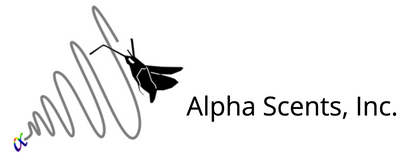Alpha Scents was recently granted a patent on its improved ACP lure!
Dr. Darek Czokajlo, President and CEO of AlphaScents, Inc. recently received a patent for the improved trap and lure system for the Asian Citrus Psyllid. Working in conjunction with Dr. Mamoudou Setamou and Dr. Robert Saldana, they developed a more effective system to lure and trap target insects. The patented semiochemicals in the lure, combined with the no mess sticky cards provide up to 6-8X more sensitive monitoring and trapping. This improved trapping provides better accuracy in determining the actual pest pressure. This makes it easier to determine the best course of action that the farmers should take to control the pests and the spread of HLB.
AlphaScents is proud to be able to offer the newest and most effective traps and lures on the market. Research and development continues to be one of our top priorities.
An excerpt from the trials that led to the patent is below, published by Citrograph Magazine.
"An effective trapping system is paramount for quarantine programs, such as those currently in place in California and Texas. Quarantine programs rely heavily on the detection of pests at very low population levels in order to successfully eradicate targeted pest with insecticides. Given that visual color-based traps are only attractive to ACP from a short distance, an attractive lure that would capture ACP more effectively from longer distances and when psyllid populations are low would increase the confidence level in survey results.
Pesticides used for eradication purposes could be used more judiciously.
An effective lure for monitoring ACP would also be useful in areas of the country where ACP are endemic and eradication is no longer possible, such as in Florida. Growers rely heavily on insecticides to reduce ACP populations in order to reduce the spread of the pathogen that causes HLB. Monitoring for the pest is difficult, time consuming and expensive. However, the increased need for insecticide sprays to control ACP is also very expensive, and the potential for the development of insecticide resistance in ACP populations already has been proven scientifically in Florida. Therefore, a more effective trap and lure system would be useful to more accurately estimate the number of psyllids in a given area. Pesticide applications could be based on ACP population density rather than on a calendar basis, and, therefore, greatly reduce the number of applications.
"In summary, several promising blends for the capture of ACP were determined in this investigation. These blends hold potential as possible commercial lures for improved monitoring of ACP. Three to four times higher trap captures were achieved using various blends as compared to un-baited traps. These blends need to be further tested in larger field studies for confirmation of their effectiveness and possible refinement of their final formulations. All experimental lures were active in the field for more than four weeks. Alpha Scents’ ACP trap attracts three to four times more ACP than standard yellow trap; and in addition; the lure will attract three to four times more psyllids. Taking this into consideration, we can state that monitoring ACP with Alpha Scents’ ACP trap and lure is six to eight times more effective than the currently used un-baited yellow traps.
Acknowledgements
This research was partially co-funded by the Citrus Research Board, Texas Citrus Mutual and Alpha Scents, Inc. We acknowledge the assistance of Anna Soper, USDA-APHIS, with the California studies."


